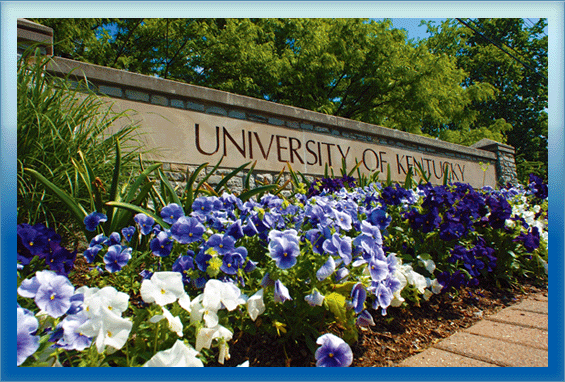|
|||||
https://www.as.uky.edu/map-directions
The University of Kentucky's College of Arts and Sciences is located in Kentucky's scenic Bluegrass region, only a few minutes from downtown Lexington. The college is housed in 21 buildings and is home to more than 5,800 undergraduate and graduate students and over 500 faculty and staff College of Arts & Sciences 202 Patterson Office Tower Lexington, KY 40506-0027 Phone: 859-257-8354 In collaboration with the Atwood group, we are preparing a series of simple S containing compounds to coordinate to Hg and to precipitate it from solution. An REU student would prepare such a compound and see how effective it is as a Hg precipitator.
I have found that undergraduates
learn the most when they can begin with a known synthetic sequence and
then follow it up with novel reactions. They gain
|
|
| experience and confidence when they prepare a known compound and can compare their results with those reported in the literature. They then experience the joys and frustrations of research at the frontiers of knowledge when they carry out reactions whose outcomes are less certain, and they have to identify both conditions that lead to single products and the identities of those products. For these reasons, the project I have described above is perfect for an REU experience. | |
Further details of Dr. Grossman's work are given on the Chemistry website.
Phone: (859) 257-1285
FAX: (859) 323-1069
Email: robert.grossman@uky.edu
1987 A.B., Princeton University
Advisor: Robert A. Pascal, Jr.
1992 Ph.D., Massachusetts Institute of Technology
Advisor: Stephen L. Buchwald
1992-1994 NATO-NSF Post-doctoral Fellow, Cambridge University
Advisor: Steven V. Ley
Postdoctoral Fellowships available for qualified applicants (US citizens only). The Art of Writing Reasonable Organic Reaction Mechanisms, 2nd edition.New! Web-based, interactive mechanism problems from the textbook!I teach a two-day "short course" based on this book that is intended for BS- and MS-level chemists in the pharmaceutical and contract synthesis industries. Please contact me if you are interested in bringing me to your company's site to teach the course. Our group develops new synthetic methods and applies them to the synthesis of natural products and biologically relevant compounds. Students learn skills that prepare them for employment in the pharmaceutical and contract synthesis industries. Research Project 1: Double AnnulationOur group has discovered a suite of reactions we call the double annulation route to fused bicyclic compounds. In the first step of the double annulation, two good carbon acids connected by a tether and an ethynyl ketone undergo a double Michael reaction to give a carbocyclic or heterocyclic compound in what is formally an [n + 1] annulation.



|
 |
 |
 |
|||
| The National Science Foundation | and | The National Institutes of Health | and | Prentice-Hall, Inc. |
Publication list.
Graduate studies in the UK Department of Chemistry.
Other useful and interesting chemistry-related sites:
- Word processing and HTML:
- Microsoft Word macros for chemists. Includes macros that automatically renumber compounds or Schemes and Figures and shortcut keys and buttons for common chemical symbols such as ≡ and →. Also fixes that annoying feature that when the user tries to turn Bold or Italics off at the end of a word before a punctuation mark, the entire word loses its Bold or Italics.
- How to make nonstandard characters appear in HTML documents.
- How to make Symbol font characters appear properly in Word for MacOS X documents uploaded to NSF's Fastlane.
- Some Java software for chemistry:
- IUPAC's online naming service.
- Jmol, an open-source, platform-independent Java software for viewing chemical structures in 3D. It is intended as a substitute for Chime, which does not work with MacOS X browsers. Copy a URL of a MOL or PDB file from a Web site and paste it (use CONTROL-V, not COMMAND-V) directly into Jmol to see and manipulate the structure.
- Marvin, programs for drawing, manipulating, and viewing chemical structures. Free for student and academic use! Both PC and Mac desktop versions available, as well as Java applets for building Web applications.
- A more accurate vapor-pressure nomograph.
- Our own functional-group finder. Find out what functional groups are in your compound, and then see how each functional group is defined.
- Our own electron-flow arrows calculator. Draw starting materials and electron-flow (curved, Robinson, mechanism) arrows, and the program will calculate the products. Especially useful for students trying to learn how to draw electron-flow arrows properly.
- Spectroscopy:
- The Spectral Database System of the Japanese National Institute of Advanced Industrial Science and Technology has 1H and 13C NMR, IR, mass, and Raman spectra for a large number of compounds.
- NMRShiftDB is an open-source, open-access, open-submission, open-content web database for chemical structures and their associated nuclear magnetic resonance data.
- The chemistry Webbook of the US National Institute of Standards and Technology doesn't have NMR data but has a lot of other information.
- iNMR, NMR spectral simulation software for Mac OS X.
- A paper tabulating chemical shifts of common impurities in NMR spectra.
- Tables and more tables of 1H and 13C NMR chemical shifts.
- Chemistry community:
- United States synthetic organic research groups.
- Organic Division of the American Chemical Society.
- Kentucky, United States, and international chemistry departments.
- Biographies of African-American scientists past and present.
- Miscellaneous chemistry references:
- Help with stereochemistry.
- A bibliography of all organic chemistry review articles in English.
- Links to selected online chemistry journals of interest to synthetic organic chemists.
- Links to sites listing acronyms, name reactions, named reagents, named rules and effects, and pKa values.
- An organic chemistry portal. Among other things, it has useful links to a variety of organic-chemistry-related Web sites.
Personal:
- Visit a Web site promoting cycling around UK and in Lexington, and sign up for our email list if you're a commuter-cyclist.
- I like to bicycle around the central Kentucky countryside with the Bluegrass Cycling Club.
- My family belongs to Ohavay Zion Synagogue.
- Online inventory of my foreign coin collection.

http://newdrugapprovals.org/
 DRUG APPROVALS BY DR ANTHONY MELVIN CRASTO
DRUG APPROVALS BY DR ANTHONY MELVIN CRASTO DRUG APPROVALS BY DR ANTHONY MELVIN CRASTO .....FOR BLOG HOME CLICK HERE
DRUG APPROVALS BY DR ANTHONY MELVIN CRASTO .....FOR BLOG HOME CLICK HERE











Tesunate 50mg Tablet is an antiparasitic medication. It is used in the treatment of malaria. It is not used to prevent malaria or to treat severe malaria where it has affected the brain, lungs, or kidneys. you can take the medicine regularly as per the doctor's prescription.
ReplyDelete